
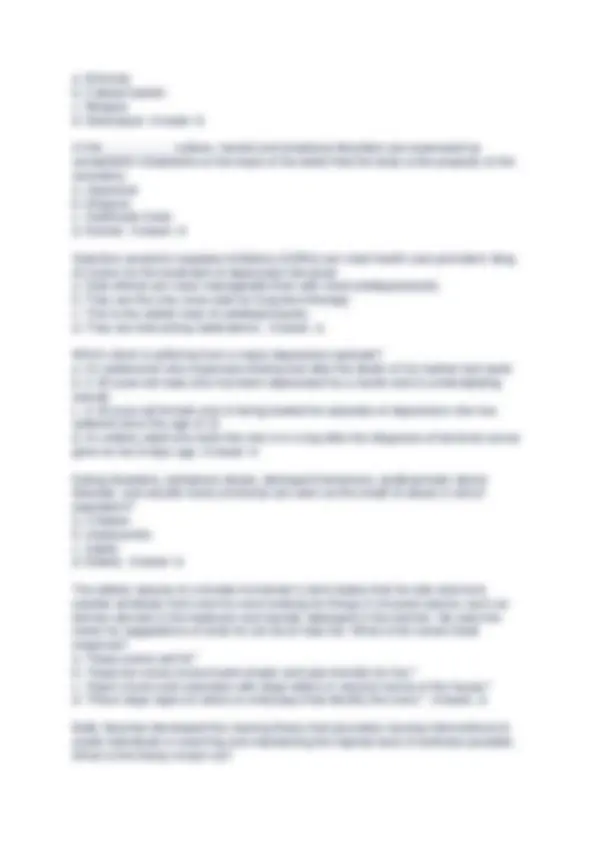
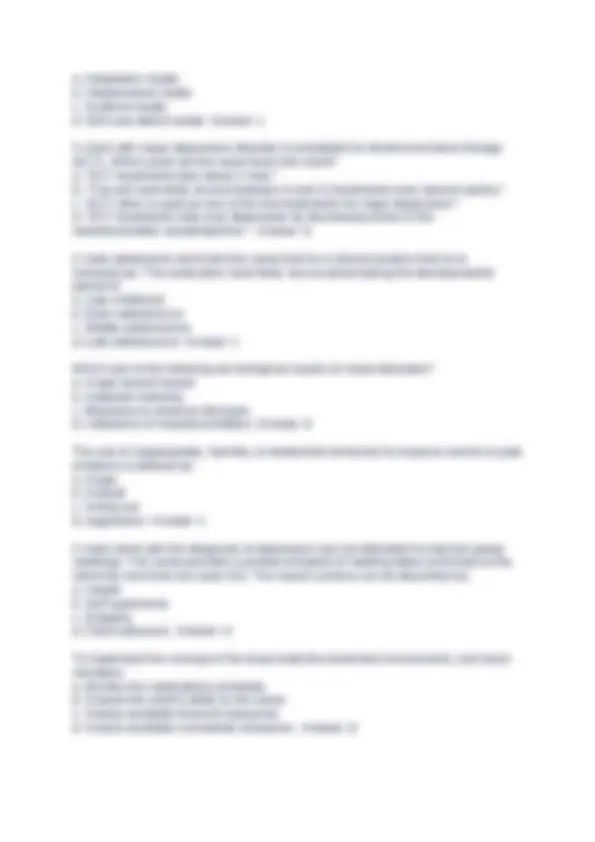
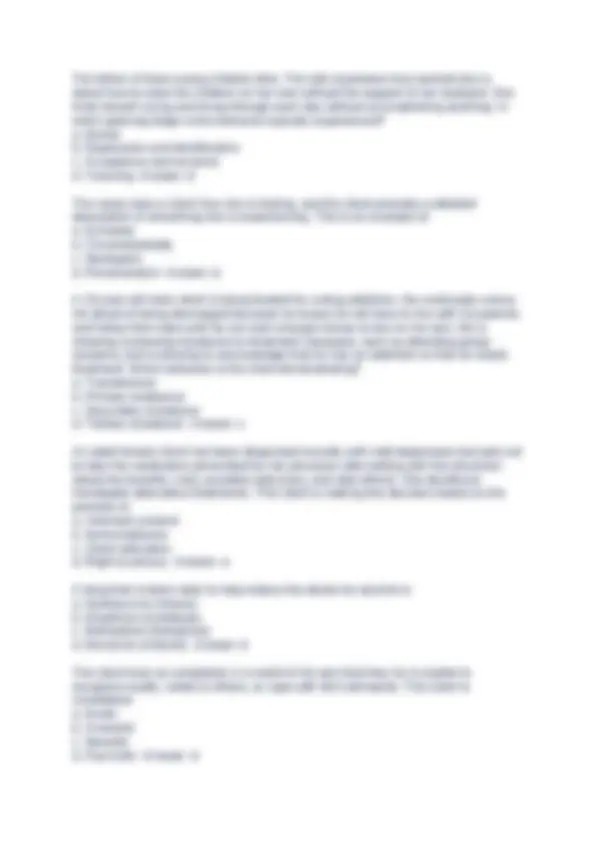
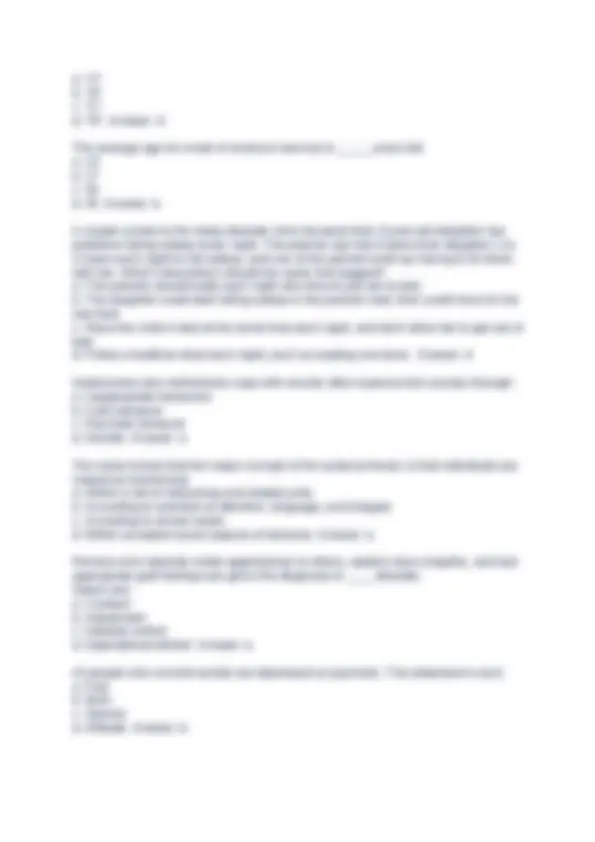
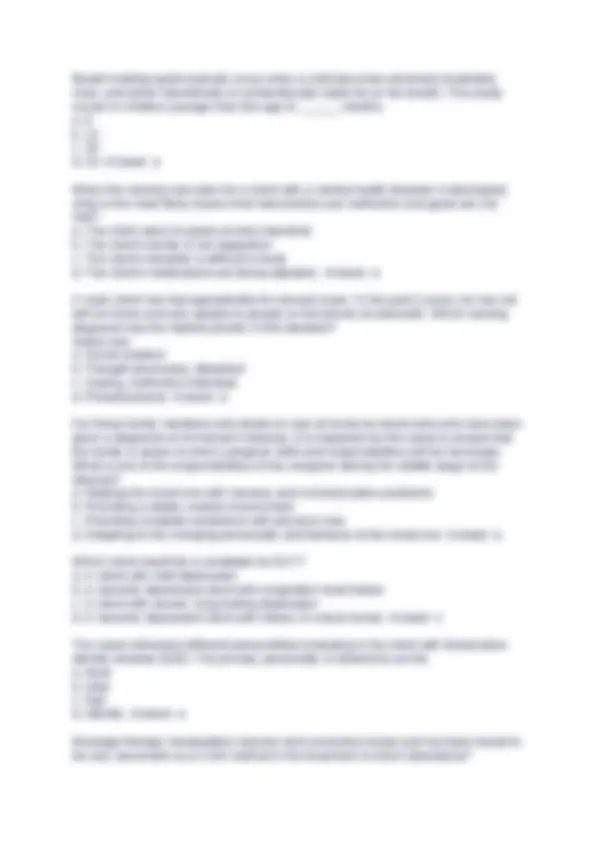
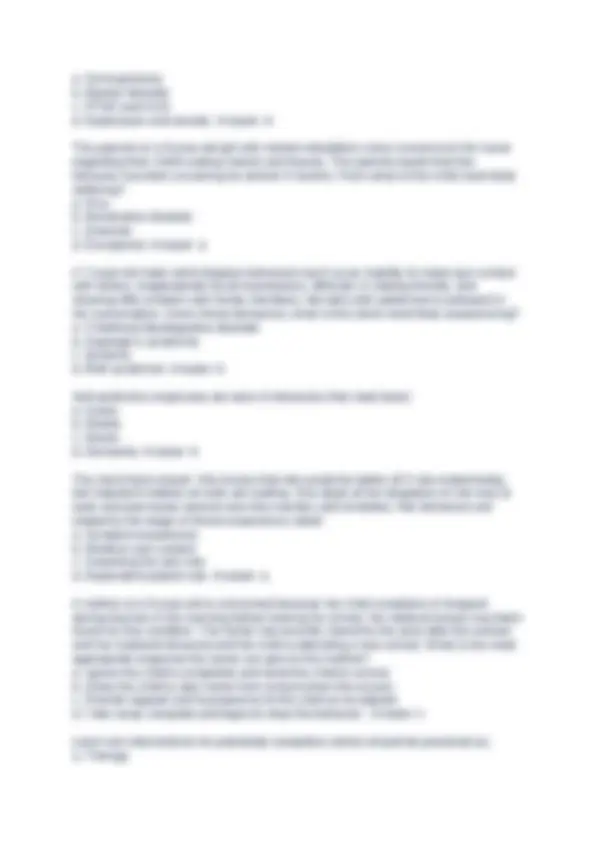
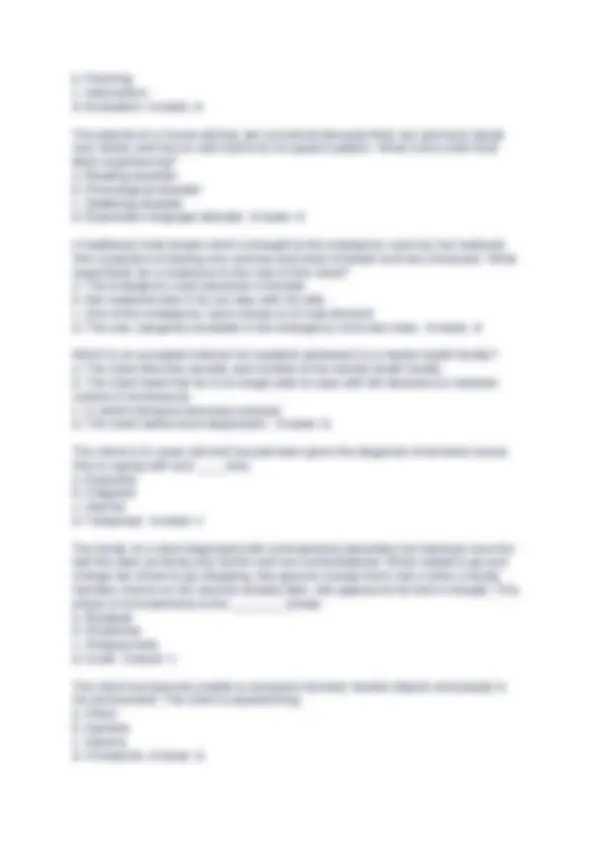
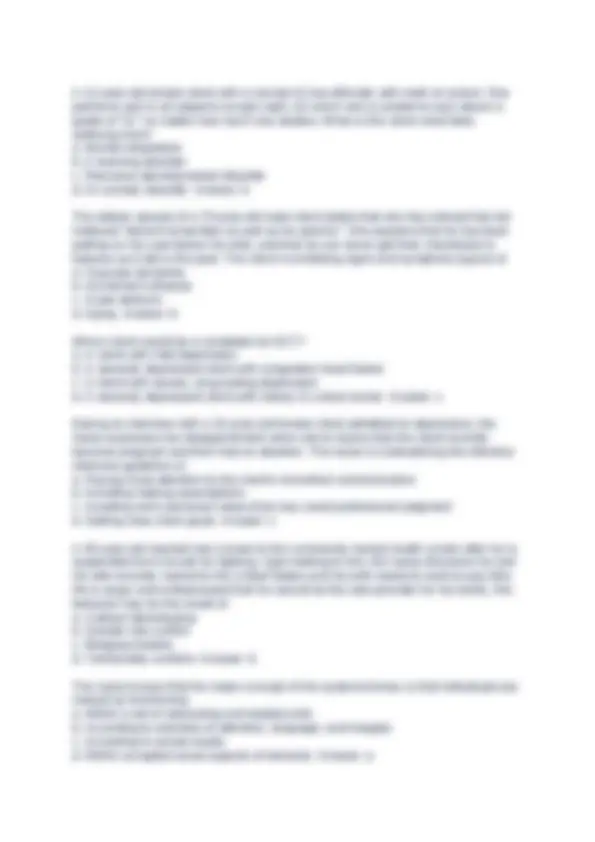
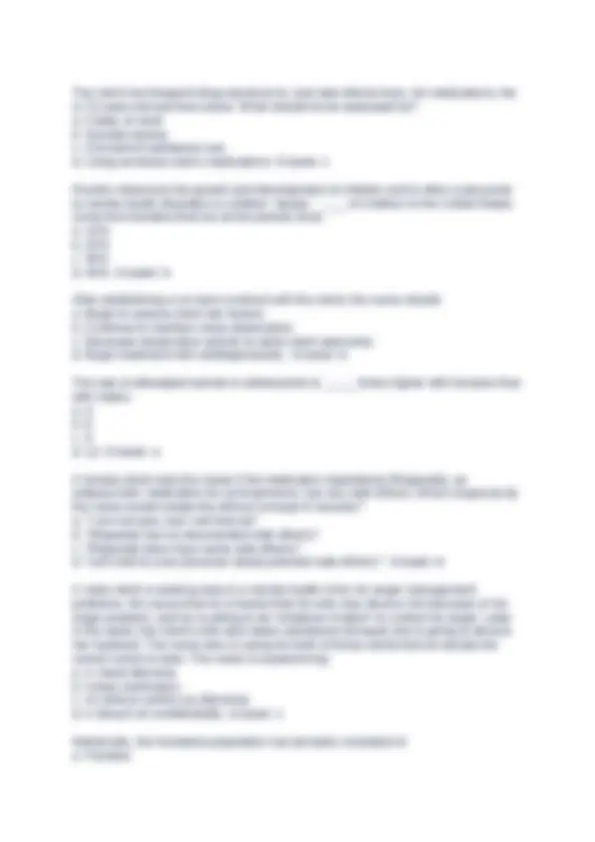
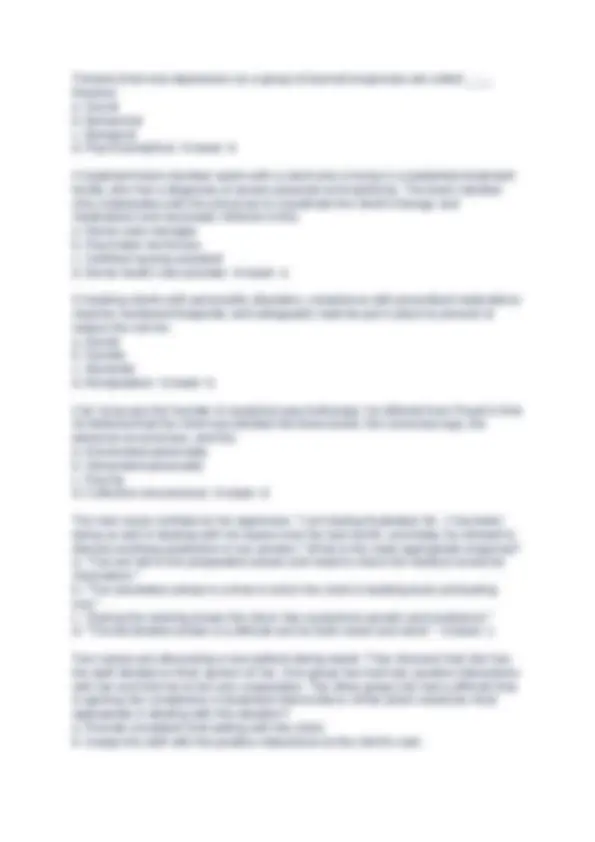
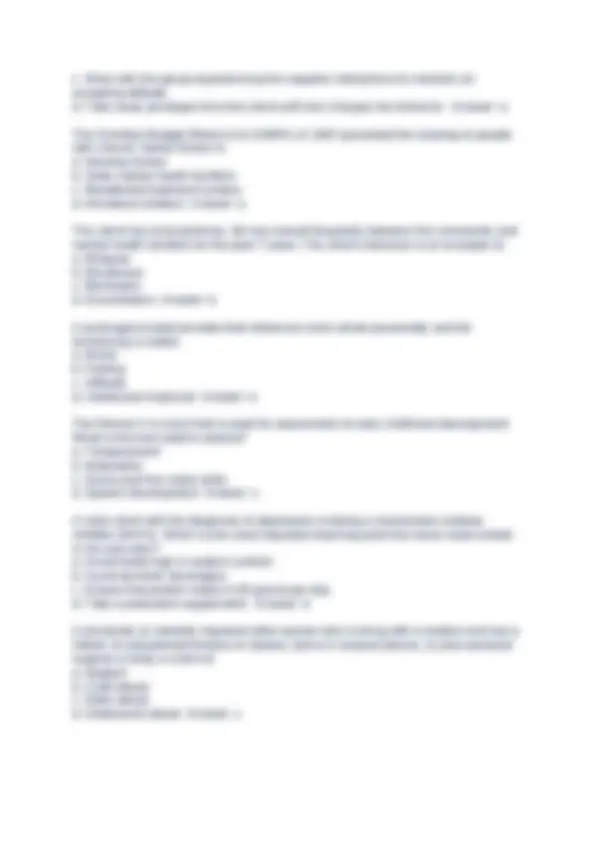
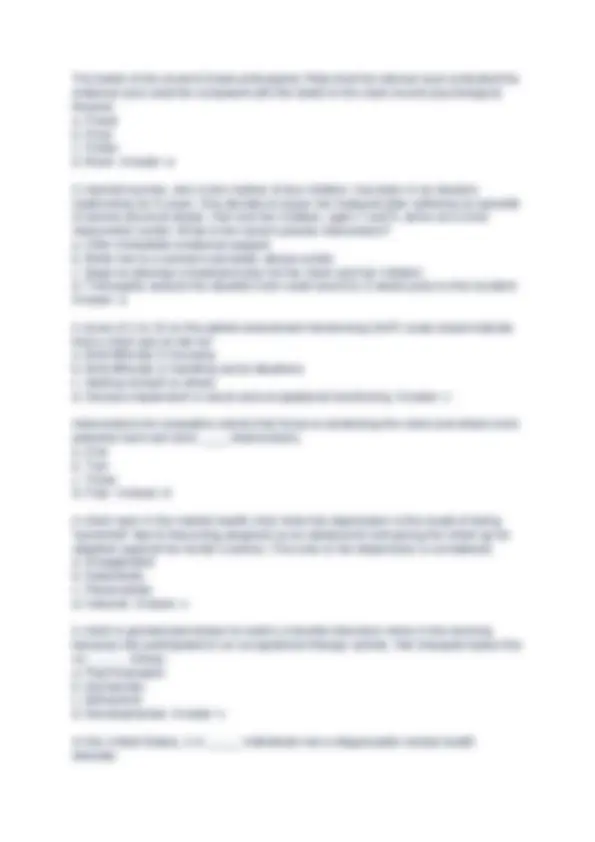
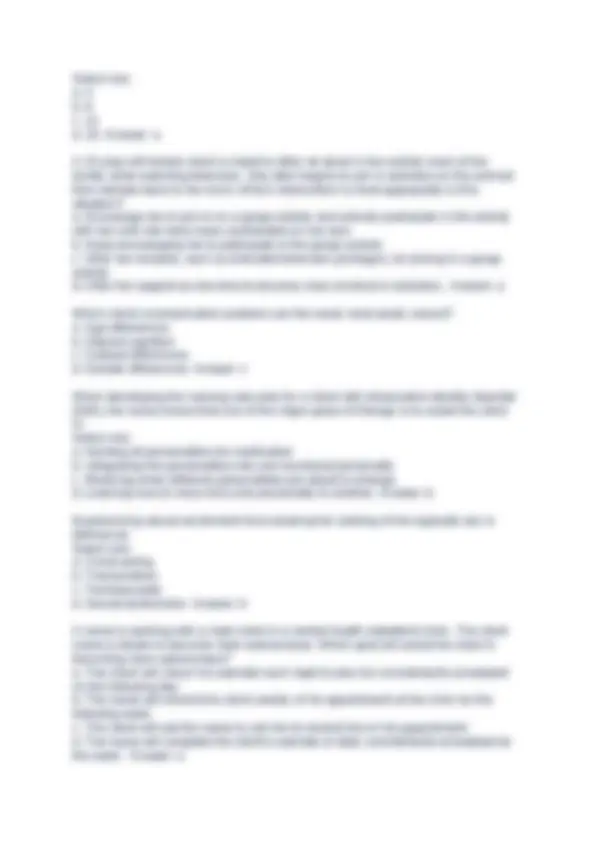
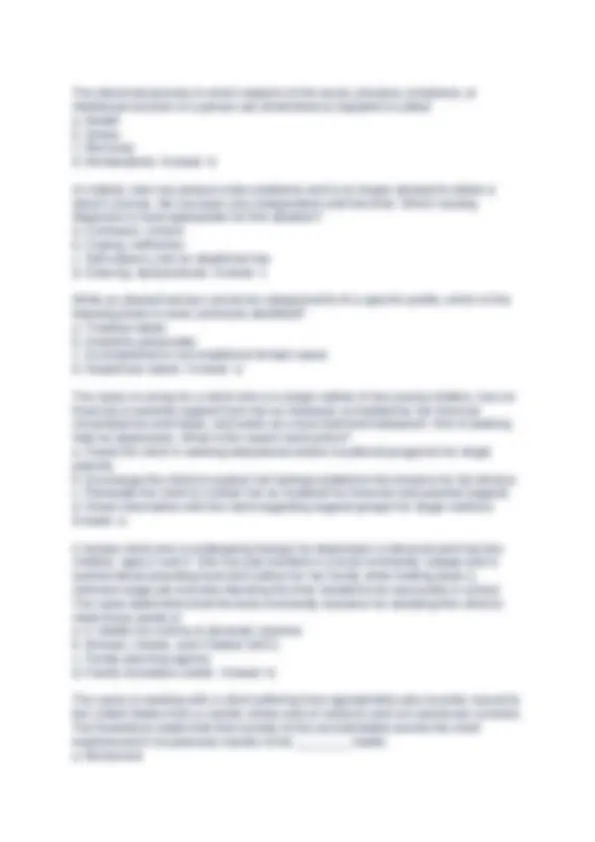
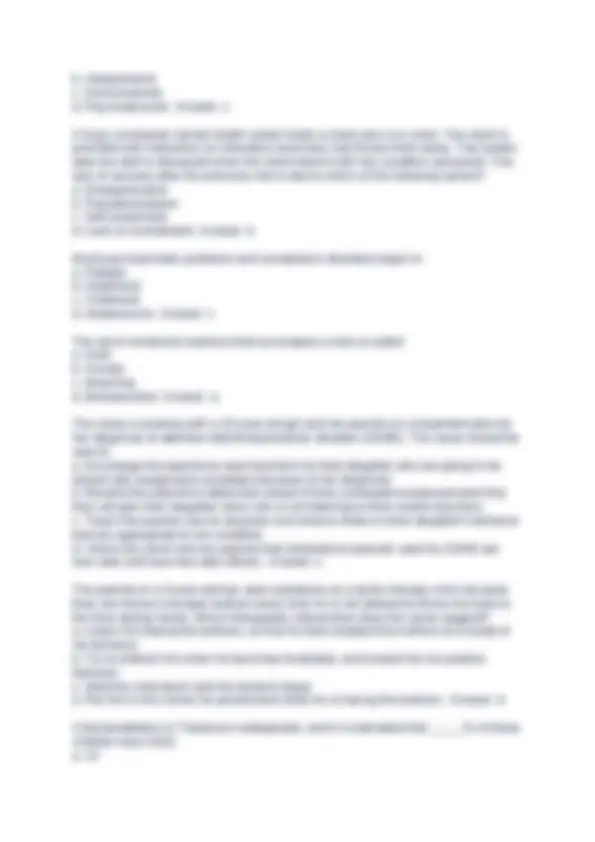
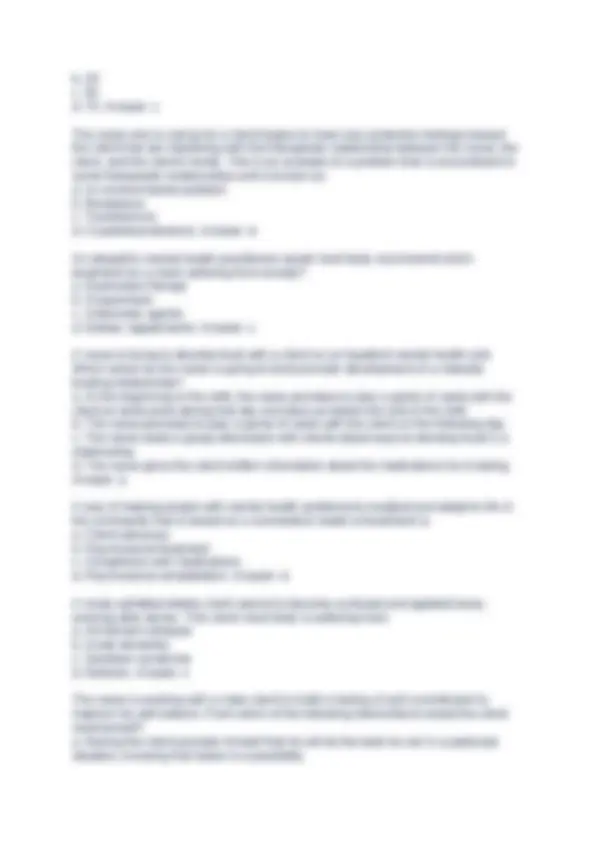
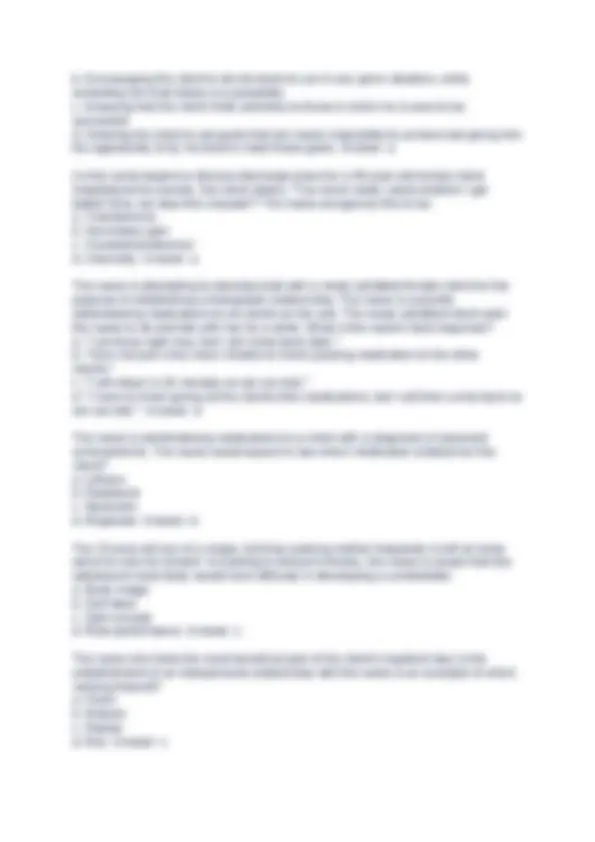
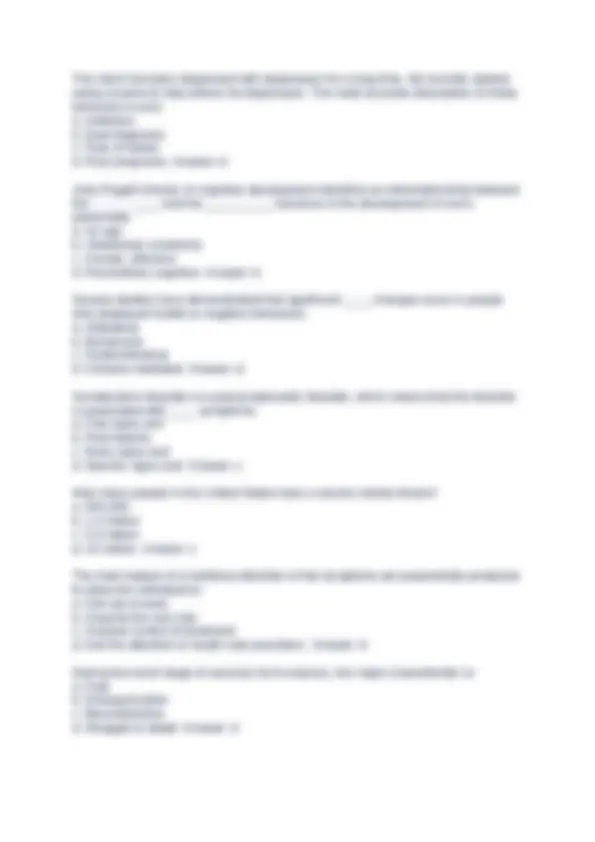
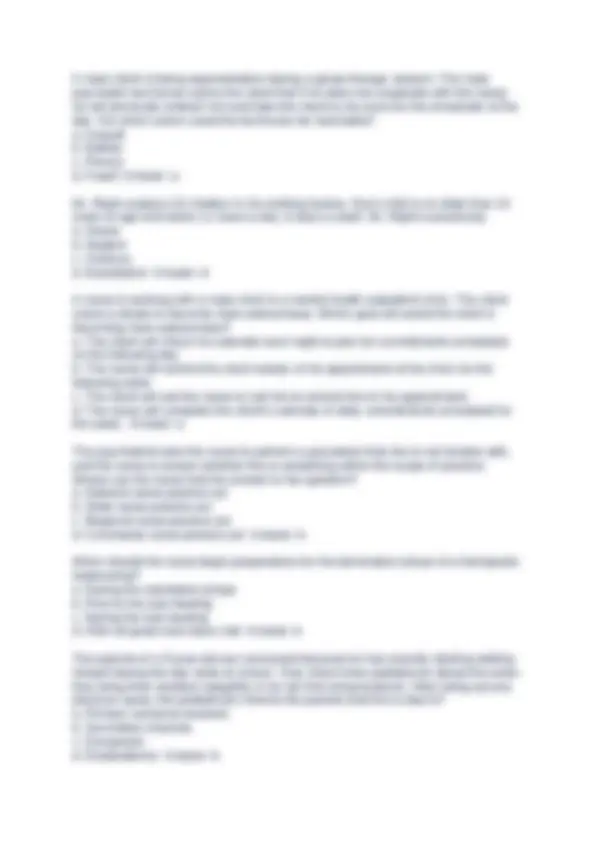
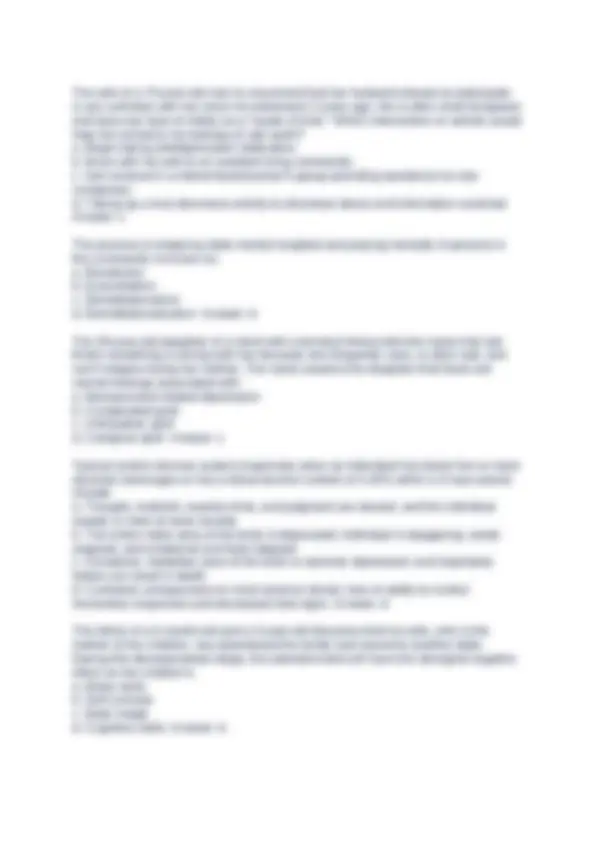
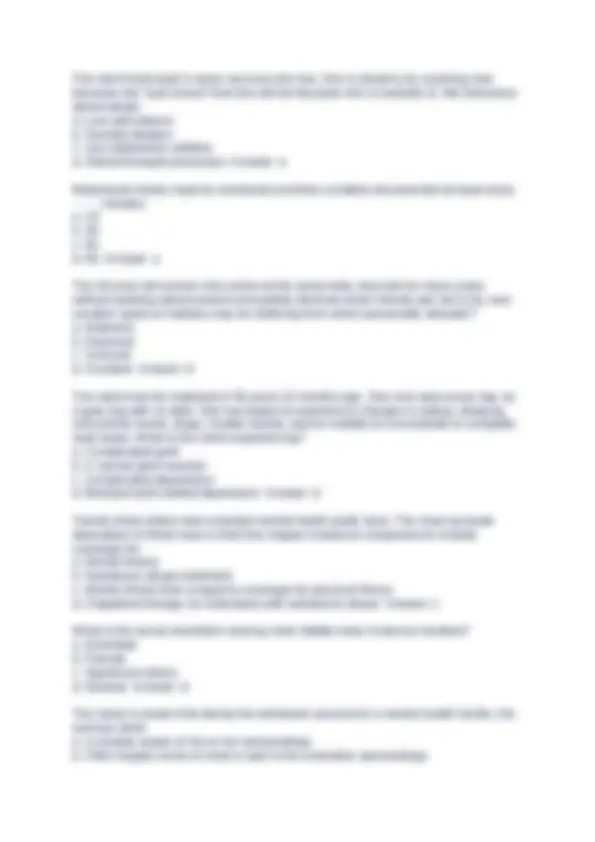
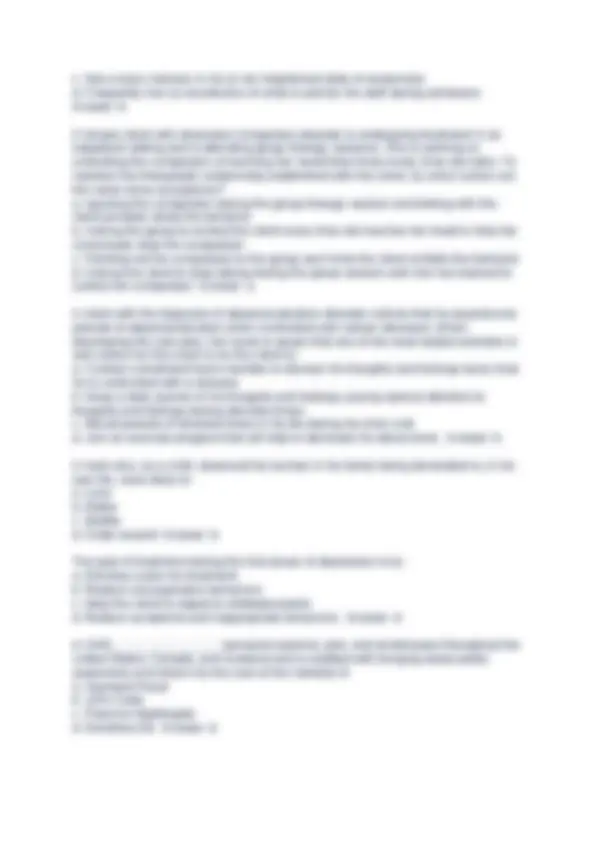
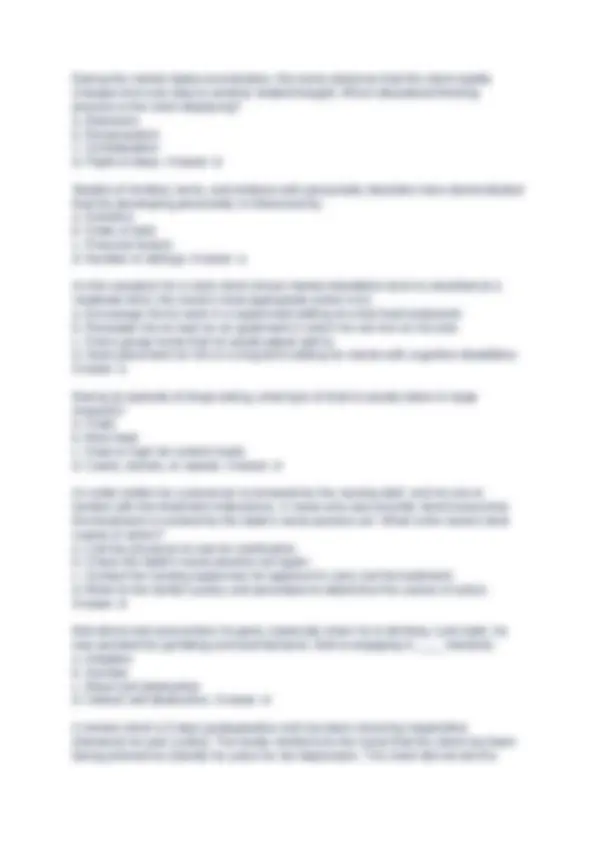
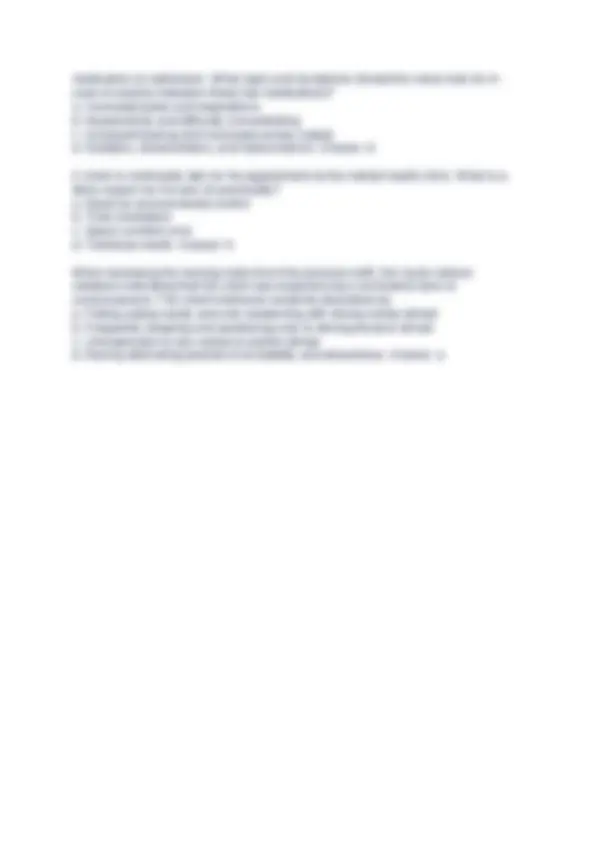


Study with the several resources on Docsity

Earn points by helping other students or get them with a premium plan


Prepare for your exams
Study with the several resources on Docsity

Earn points to download
Earn points by helping other students or get them with a premium plan
Community
Ask the community for help and clear up your study doubts
Discover the best universities in your country according to Docsity users
Free resources
Download our free guides on studying techniques, anxiety management strategies, and thesis advice from Docsity tutors
A set of practice exam questions and answers for mental health technicians. The questions cover a range of topics related to mental health, including medication, therapy, assessment, and treatment. The questions are designed to test the knowledge and skills of mental health technicians and help them prepare for certification exams. correct answers to each question, along with an explanation of why the answer is correct. The questions are multiple-choice and cover a range of difficulty levels.
Typology: Exams
1 / 32

This page cannot be seen from the preview
Don't miss anything!

























The medication donepezil (Aricept) frequently is used to treat the early-stage symptoms of Alzheimer's disease. When administering this particular medication, the nurse should be especially alert to assess the client for: a. Weight changes b. Tremors c. Increased sweating d. Alterations in blood pressure Answer- d The mother of a 20-year-old man diagnosed with paranoid schizophrenia is upset by the fact that her child tried to attack her during her daily visit. What is the most appropriate support the nurse can give her after this incident? a. "Your child is working through relationship issues with you and does not know how to express them." b. "You should stop coming for a while, as your visits upset your child." c. "Your child's illness is due to a loss of contact with reality, and not directed to you as his mother." d. "You must make him realize that his behavior toward you is inappropriate." Answer- c Suicide is attempted three times more frequently by ____ but is more often successfully completed by ____. a. Adult men, women b. Adult women, men c. Adult fathers, mothers d. Adolescent mothers, fathers Answer- b Color therapy has been found to be especially effective in the treatment of: a. Seasonal affective disorder b. Bipolar disorder c. Drug addiction d. Generalized anxiety disorder Answer- a During the mental status assessment, the nurse hands the client a piece of paper that reads "Please raise your left hand." If the client follows the command, the nurse has just assessed which ability of the client? a. Abstract thinking b. Reading
c. General knowledge d. Memory Answer- b During the preparation phase of a therapeutic relationship with a client, what is the main task to be completed by the nurse? a. To establish with the client the purpose of the relationship b. To gather and review all possible information regarding the client c. To build trust with the client d. To obtain agreement from the client to work in conjunction with the nurse Answer- b Without assessment of six specific aspects of an individual's being, the mental health nurse's scope of care is narrow and limited in effectiveness. These aspects include social, physical, cultural, intellectual, emotional, and spiritual areas of a person's life, known as a(n) __________ assessment. a. Complete b. Accurate c. Holistic d. Psychiatric Answer- c Which of the following persons is most likely a candidate for primary hypersomnia? a. A 50-year-old who has wakeful periods during the night and naps during the day following the death of her husband b. A 6-year-old who wakes up in the middle of the night after having a nightmare and is tired the next day c. An obese 40-year-old who has snoring and periods of apnea at night and is tired the next day d. An 18-year-old college student whose mother complains he sleeps all night and still naps during the day Answer- d In the early twentieth century, a frontal lobotomy was a common treatment for violent behaviors. Which description of this procedure is accurate? a. A procedure that delivers an electrical stimulus to the frontal lobes of the brain b. A surgical procedure that drills holes in the front of the skull to drain fluid c. A surgical procedure that severs the frontal lobes of the brain from the thalamus d. A surgical procedure that inserts implants into the frontal lobes of the brain Answer- c According to Freud's theory, a baby who is crying in response to wanting to be held by his mother is an example of which part of the personality's control over behavior? a. Id b. Ego c. Superego d. Self-control Answer- a An older Asian female with a diagnosis of depression is cared for by her granddaughter. Her granddaughter is very attentive to the client's needs, attends every therapy session, and is active in the planning and implementing of the treatment plan. The granddaughter's valuing of her grandmother is most likely due to her:
a. Adaptation model b. Interpersonal model c. Systems model d. Self-care deficit model Answer- c A client with major depressive disorder is scheduled for electroconvulsive therapy (ECT). Which point will the nurse teach the client? a. "ECT treatments take about 1 hour." b. "You will most likely receive between 6 and 12 treatments over several weeks." c. "ECT often is used as one of the first treatments for major depression." d. "ECT treatments help your depression by decreasing levels of the neurotransmitter norepinephrine." Answer- b A male adolescent client tells the nurse that he is almost positive that he is homosexual. This realization most likely has occurred during the developmental period of: a. Late childhood b. Early adolescence c. Middle adolescence d. Late adolescence Answer- c Which one of the following are biological causes of mood disorders? a. Anger turned inward b. Impaired nurturing c. Reactions to external stressors d. Imbalance of neurotransmitters Answer- d The use of inappropriate, harmful, or destructive behaviors to express current or past emotions is defined as: a. Anger b. Assault c. Acting out d. Aggression Answer- c A male client with the diagnosis of depression has not attended his last two group meetings. The nurse provides a printed schedule of meeting dates and times to the client the next time she sees him. The nurse's actions can be described as: a. Insight b. Self-awareness c. Empathy d. Client advocacy Answer- d To implement the concept of the least restrictive treatment environment, care team members: a. Monitor the medications schedule. b. Assess the client's ability to live alone. c. Assess available financial resources. d. Assess available community resources. Answer- d
The father of three young children dies. The wife expresses how worried she is about how to raise the children on her own without the support of her husband. She finds herself crying and living through each day without accomplishing anything. In which grieving stage is this behavior typically experienced? a. Denial b. Depression and identification c. Acceptance and recovery d. Yearning Answer- d The nurse asks a client how she is feeling, and the client provides a detailed description of everything she is experiencing. This is an example of: a. Echolalia b. Circumstantiality c. Neologism d. Perseveration Answer- b A 19-year-old male client is being treated for a drug addiction. He continually voices his dread of being discharged because he knows he will have to live with his parents and follow their rules until he can earn enough money to live on his own. He is showing increasing resistance to treatment measures, such as attending group sessions, but is refusing to acknowledge that he has an addiction or that he needs treatment. Which behavior is the client demonstrating? a. Transference b. Primary resistance c. Secondary resistance d. Tertiary resistance Answer- c An adult female client has been diagnosed recently with mild depression but opts not to take the medication prescribed by her physician after talking with the physician about the benefits, risks, possible outcomes, and side effects. She decides to investigate alternative treatments. This client is making this decision based on the premise of: a. Informed consent b. Noncompliance c. Client education d. Right to privacy Answer- a A drug that is taken daily to help reduce the desire for alcohol is: a. Hydroxyzine (Atarax) b. Disulfiram (Antabuse) c. Methadone (Dolophine) d. Meclizine (Antivert) Answer- b The client lives so completely in a world of his own that they he is unable to recognize reality, relate to others, or cope with life's demands. This client is considered: a. Exotic b. Anorectic c. Neurotic d. Psychotic Answer- d
During the continuation phase of therapy, a client with a diagnosis of depression asks, "What is the goal of therapy during this 4- to 9-month period?" What is the nurse's best response? a. "We are going to work together to try to reduce your symptoms." b. "Our goal is to determine the cause of your depression and cure it." c. "We want to prevent you from ever having any depressive episodes in the future." d. "Our goal is to prevent you from relapsing and experiencing distressing emotional states." Answer- d Nearly __________ of all countries in the world have no clear governmental policy that addresses mental health issues. a. 7% b. 26% c. 50% d. 75% Answer- c Interventions for assaultive clients that focus on protecting the client and others from potential harm are level ____ interventions. Select one: a. One b. Two c. Three d. Four Answer- b A client does not participate in group sessions due to feeling inferior to others in the group. Based on cognitive behavioral theory, he would be directed to: a. Review his previous relationship with his parents. b. Participate in group to receive extra privileges. c. Suppress negative thoughts about the group. d. Recognize and change his negative thoughts. Answer- d The caregiver works with suicidal clients to establish therapeutic rapport. The focused communications and concerned actions encourage suicidal persons to: a. Feel in control b. Feel self-worth c. Talk about themselves d. Feel foolish for thinking about suicide Answer- b During a session with a female client with a diagnosis of social phobia, she talks about how proud she is of herself because she was finally able to shop at the grocery store. The nurse documents the events and knows that this would be considered which phase of the nursing process? a. Assessment b. Planning c. Intervention d. Evaluation Answer- d In 2006, the National Alliance on Mental Illness (NAMI) conducted a comprehensive survey and grading of state mental health care for adults and learned that the overall grade for care was:
a. "A" b. "B" c. "C" d. "D" Answer- d The average age for onset of anorexia nervosa is _____ years old. a. 13 b. 17 c. 33 d. 40 Answer- b A couple comes to the sleep disorder clinic because their 3-year-old daughter has problems falling asleep every night. The parents say that it takes their daughter 1 to 2 hours each night to fall asleep, and one of the parents ends up having to lie down with her. Which intervention should the nurse first suggest? a. The parents should trade each night who tries to put her to bed. b. The daughter could start falling asleep in the parents' bed, then could move to her own bed. c. Place the child in bed at the same time each night, and don't allow her to get out of bed. d. Follow a bedtime ritual each night, such as reading one book. Answer- d Adolescents who ineffectively cope with anxiety often express their anxiety through: a. Inappropriate behaviors b. Calm behavior c. Psychotic behavior d. Suicide Answer- a The nurse knows that the major concept of the systems theory is that individuals are viewed as functioning: a. Within a set of interacting and related units b. According to activities of attention, language, and imagery c. According to unmet needs d. Within accepted social aspects of behavior Answer- a Persons who naturally relate aggressively to others, seldom have empathy, and lack appropriate guilt feelings are given the diagnosis of ____ disorder. Select one: a. Conduct b. Adjustment c. Impulse-control d. Oppositional defiant Answer- a All people who commit suicide are depressed or psychotic. This statement is a(n): a. Fact b. Myth c. Opinion d. Attitude Answer- b
a. Schizophrenia b. Bipolar disorder c. PTSD and OCD d. Depression and anxiety Answer- d The parents of a 9-year-old girl with mental retardation voice concerns to the nurse regarding their child's eating insects and leaves. The parents report that this behavior has been occurring for almost 4 months. From what is this child most likely suffering? a. Pica b. Rumination disorder c. Enuresis d. Encopresis Answer- a A 7-year-old male client displays behaviors such as an inability to make eye contact with others, inappropriate facial expressions, difficulty in making friends, and showing little emotion with family members. He talks with adults but is awkward in his conversation. Given these behaviors, what is this client most likely experiencing? a. Childhood disintegrative disorder b. Asperger's syndrome c. Dyslexia d. Rett syndrome Answer- b Self-protective responses are seen in behaviors that meet basic: a. Goals b. Needs c. Wants d. Demands Answer- b The client feels unwell. She knows that she would be better off if she rested today, but important matters at work are waiting. She stops at the drugstore on her way to work and purchases several over-the-counter cold remedies. Her behaviors are related to the stage of illness experience called: a. Symptom experience b. Medical care contact c. Assuming the sick role d. Dependent patient role Answer- a A mother of a 9-year-old is concerned because her child complains of frequent stomachaches in the morning before leaving for school. No medical reason has been found for this condition. The family has recently moved to the area after the woman and her husband divorced and the child is attending a new school. What is the most appropriate response the nurse can give to this mother? a. Ignore the child's complaints and send the child to school. b. Allow the child to stay home from school when this occurs. c. Provide support and reassurance to the child as he adjusts. d. Take away computer privileges to stop this behavior. Answer- c Level one interventions for potentially assaultive clients should be practiced as: a. Therapy
b. Control methods c. Assessment measures d. Preventive measures Answer- d One of the developmental tasks of adolescence is to establish intimacy and relationships. By the age of 14, what percentage of teens have experienced sexual intercourse? a. 10% b. 25% c. 50% d. 85% Answer- c Personality disorders in the adolescent are characterized by: a. Onset usually in middle childhood b. Impulsivity c. Flexibility d. High self-esteem Answer- b The term "sandwich generation" best describes adults: a. Caught between adulthood and late adulthood b. Caring for their children and aging parents c. Caring for their children and grandchildren d. Caught between young adulthood and adulthood Answer- b The client had recently witnessed a horrific auto accident. Now she is complaining of double vision, loss of balance, and a constant "lump in her throat." She is exhibiting the signs and symptoms of: a. Anxiety reaction b. Behavioral disorder c. Conversion disorder d. Posttraumatic stress reaction Answer- c A female client with a psychotic disorder is experiencing olfactory hallucinations. Most likely, she would be complaining of a _____ that is disturbing to her. a. Vision b. Sound c. Smell d. Sense of touch Answer- c In 1937, Congress passed the Hill-Burton Act, which was significant for the treatment of mental health: a. Research on drugs for the treatment of mental health disorders b. Training of mental health professionals c. Construction of psychiatric units in facilities throughout North America d. Development of community mental health clinics Answer- c A 6-year-old is preparing to have a dental procedure. His anxious mother is in the room with him. When the child asks if everything will be okay, she assures him it will, but continues to pace and wring her hands. What is the most appropriate action for the dentist to take?
b. Planning c. Intervention d. Evaluation Answer- d The parents of a 3-year-old boy are concerned because their son seems to speak very slowly and has an odd rhythm to his speech pattern. What is this child most likely experiencing? a. Reading disorder b. Phonological disorder c. Stuttering disorder d. Expressive language disorder Answer- d A traditional Arab female client is brought to the emergency room by her husband. She complains of feeling very anxious and short of breath and has chest pain. What would likely be a hindrance to the care of this client? a. The emergency room physician is female. b. Her husband asks if he can stay with his wife. c. One of the emergency room nurses is of Arab descent. d. The only caregivers available in the emergency room are male. Answer- d Which is an accepted criterion for inpatient admission to a mental health facility? a. The client likes the security and comfort of the mental health facility. b. The client feels that he is no longer able to cope with life stressors or maintain control of his behavior. c. A client's behavior becomes unusual. d. The client suffers from depression. Answer- b The client is 21 years old and has just been given the diagnosis of terminal cancer. She is coping with a(n) ____ loss. a. Expected b. Imagined c. Internal d. Temporary Answer- c The family of a client diagnosed with schizophrenia describes her behavior over the last few days as being very docile and non-confrontational. When asked to go and change her shoes to go shopping, she goes to change them, but a when a family member checks on her several minutes later, she appears to be lost in thought. This phase of schizophrenia is the ________ phase. a. Residual b. Prodromal c. Prespsychotic d. Acute Answer- c The client has become unable to recognize formerly familiar objects and people in his environment. The client is experiencing: a. Affect b. Agnosia c. Apraxia d. Anhedonia Answer- b
A 12-year-old female client with a normal IQ has difficulty with math at school. She performs well in all subjects except math, for which she is unable to earn above a grade of "D," no matter how much she studies. What is this client most likely suffering from? a. Mental retardation b. A learning disorder c. Pervasive developmental disorder d. An anxiety disorder Answer- b The elderly spouse of a 74-year-old male client states that she has noticed that her husband "doesn't remember as well as he used to." She explains that he has been putting on his coat before his shirt, and that he can never get their checkbook to balance as it did in the past. The client is exhibiting signs and symptoms typical of: a. Vascular dementia b. Alzheimer's disease c. Acute delirium d. Aging Answer- b Which client would be a candidate for ECT? a. A client with mild depression b. A severely depressed client with congestive heart failure c. A client with severe, long-lasting depression d. A severely depressed client with history of a brain tumor Answer- c During an interview with a 15-year-old female client admitted for depression, the nurse expresses her disappointment when she to learns that the client recently became pregnant and then had an abortion. The nurse is contradicting the effective interview guideline of: a. Paying close attention to the client's nonverbal communication b. Avoiding making assumptions c. Avoiding one's personal values that may cloud professional judgment d. Setting clear client goals Answer- c A 45-year-old married man comes to the community mental health center after he is suspended from his job for fighting. Upon talking to him, the nurse discovers he and his wife recently moved to the United States and his wife needs to work to pay bills. He is angry and embarrassed that he cannot be the sole provider for his family. His behavior may be the result of: a. Cultural stereotyping b. Gender role conflict c. Religious beliefs d. Territoriality conflicts Answer- b The nurse knows that the major concept of the systems theory is that individuals are viewed as functioning: a. Within a set of interacting and related units b. According to activities of attention, language, and imagery c. According to unmet needs d. Within accepted social aspects of behavior Answer- a
b. African-American men over 40 years of age c. White male adults with an average age of 50 years d. Individuals in their 30s with mental and physical disabilities Answer- c A client seen in the community mental health clinic appears for one appointment in multiple layers of brightly colored clothing. Her speech is very pressured, and she is telling everyone in the waiting room about a date she had the previous evening. The next visit she is dressed in old, drab clothes and has no makeup on. She has a flat affect and is not making eye contact. The most probable cause of her behaviors is which of the following conditions? a. Bipolar I disorder b. Psychosis c. Bipolar II disorder d. Major depressive episode Answer- a The client is feeling very anxious and has requested that a p.r.n. antianxiety medication be ordered. The nurse informs the client that the medication can be administered only every 4 hours and was given 3 hours ago. The nurse promises to give the client the medication as soon as it is due, but the nurse goes to lunch 1 hour later without giving the client the medication. Which ethical principle did the nurse violate? a. Fidelity b. Veracity c. Confidentiality d. Justice Answer- a Adult disorders such as chronic anxiety and depression often are associated with childhood: a. Illnesses b. Fears c. Education d. Abuse Answer- d Three years after the loss of her husband of 35 years, the wife has a full-time job but finds that she cannot sleep well at night, has frequent mood changes, and attends the couple's night out with friends that she and her husband attended. Upon seeking counseling, she discovers that she is exhibiting symptoms of: a. Bereavement-related depression b. Complicated grief c. Anticipatory grief d. Caregiver grief Answer- b The child has not developed the ability to respond to others. He cannot communicate his needs. He may remain dependent upon others throughout his life. He is most accurately described as having: a. Autism b. Anxiety c. Mental retardation d. Attention-deficit disorder Answer- a
The nurse must be alert to signs of suicidal thoughts with clients in whom major depressive disorders have been diagnosed because approximately _____ die from suicide. a. 5% b. 15% c. 25% d. 35% Answer- b If a client is involuntarily committed to a mental health care facility indefinitely, the law requires that the case must be reviewed every _____ months. a. 3 b. 6 c. 12 d. 15 Answer- c The concerns of children in whom terminal conditions have been diagnosed focus on how the illness affects the child's: a. Loss of a future b. Family and friends c. Social activities d. Activities of daily living Answer- d The nurse in the Emergency Department finds a woman collapsed on the floor and crying loudly. The woman's husband was in a car accident and is being attended to by the medical staff. Which statement by the nurse best demonstrates acting in a culturally competent manner? a. "You need to control yourself. Your husband was not injured that badly." b. "Let me take you to a room with more privacy so we can talk." c. "I am concerned about how you are acting right now. No one else here is acting like this." d. "We will call the psychiatrist to see if medication can be ordered for you." Answer- b An adolescent female client continually displays a negative attitude toward everyone she comes into contact with and toward life in general. Which action should the nurse implement first that will be helpful in assisting this client to develop a more positive attitude? a. Helping the client recognize negative thoughts, emotions, and attitudes b. Pointing out every negative behavior that the client displays c. Assisting the client to replace negative thoughts by frequently repeating positive statements d. Praising positive behavior exhibited by the client Answer- a Toddlers often express their anger through: a. Crying b. Manipulation c. Temper tantrums d. Direct aggression Answer- c
c. Work with the group experiencing the negative interactions to maintain an accepting attitude. d. Take away privileges from the client until she changes her behavior. Answer- a The Omnibus Budget Reform Act (OBRA) of 1987 prevented the housing of people with chronic mental illness in: a. Nursing homes b. State mental health facilities c. Residential treatment centers d. Homeless shelters Answer- a The client has schizophrenia. He has moved frequently between the community and mental health facilities for the past 7 years. The client's behavior is an example of: a. Relapse b. Recidivism c. Remission d. Exacerbation Answer- b A prolonged emotional state that influences one's whole personality and life functioning is called: a. Mood b. Feeling c. Attitude d. Intellectual response Answer- a The Denver II is a tool that is used for assessment of early childhood development. What is this tool used to assess? a. Temperament b. Maturation c. Gross and fine motor skills d. Speech development Answer- c A male client with the diagnosis of depression is taking a monoamine oxidase inhibitor (MAOI). Which is the most important teaching point the nurse must include in his care plan? a. Avoid foods high in sodium content. b. Avoid alcoholic beverages. c. Ensure that protein intake is 60 grams per day. d. Take a potassium supplement. Answer- b A physically or mentally impaired older woman who is living with a relative and has a history of unexplained bruises or injuries, burns in unusual places, or poor personal hygiene is likely a victim of: a. Neglect b. Child abuse c. Elder abuse d. Adolescent abuse Answer- c
The belief of the ancient Greek philosopher Plato that the rational soul controlled the irrational soul could be compared with the belief of the more recent psychological theorist: a. Freud b. Pinel c. Fisher d. Rush Answer- a A married woman, who is the mother of two children, has been in an abusive relationship for 4 years. She decides to leave her husband after suffering an episode of severe physical abuse. She and her children, ages 7 and 9, arrive at a crisis intervention center. What is the nurse's priority intervention? a. Offer immediate emotional support. b. Refer her to a woman's domestic abuse center. c. Begin to develop a treatment plan for the client and her children. d. Thoroughly assess the situation from most recent to 2 weeks prior to this incident. Answer- a A score of 1 to 10 on the global assessment functioning (GAF) scale would indicate that a client was at risk for: a. Mild difficulty in focusing b. Mild difficulty in handling social situations c. Hurting himself or others d. Serious impairment in social and occupational functioning Answer- c Interventions for assaultive clients that focus on protecting the client and others from potential harm are level ____ interventions. a. One b. Two c. Three d. Four Answer- b A client seen in the mental health clinic feels her depression is the result of being "punished" due to becoming pregnant as an adolescent and giving the infant up for adoption against her family's wishes. This view of her depression is considered: a. Exaggerated b. Naturalistic c. Personalistic d. Induced Answer- c A client is granted permission to watch a favorite television show in the evening because she participated in an occupational therapy activity. Her therapist bases this on ______ theory. a. Psychoanalytic b. Humanistic c. Behavioral d. Developmental Answer- c In the United States, 1 in _____ individuals has a diagnosable mental health disorder.